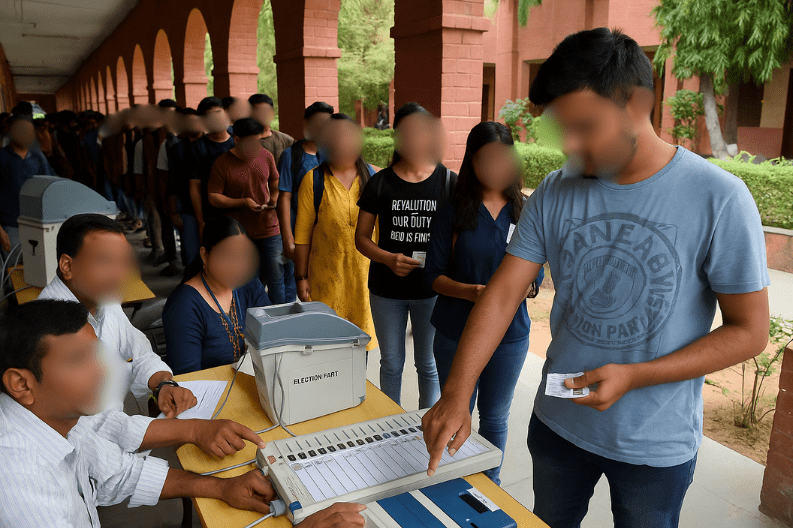New Delhi: Voting for the DUSU Elections started early Thursday morning, marking one of the biggest student political events in India. More than 2.75 lakh students from 52 colleges are eligible to vote this year, showing the large student base of Delhi University.
Polling is taking place in two shifts. Day colleges are voting from 8:30 am to 1:00 pm, while evening colleges will cast their votes from 3:00 pm to 7:30 pm. Officials will count the votes on September 19 and announce the results the same day
To manage the large number of voters, the university has set up 195 polling booths and deployed around 700 electronic voting machines. This arrangement aims to ensure that students can vote quickly and smoothly.
Three main candidates are contesting for the post of President. Aryan Mann, from the Akhil Bharatiya Vidyarthi Parishad (ABVP), is pursuing a Master’s in Library Science. Joslyn Nandita Choudhary, from the National Students’ Union of India (NSUI), is studying Buddhist Studies. Anjali, representing the SFI-AISA alliance, is from Indraprastha College for Women.
Altogether, 21 candidates are in the running for four top posts: President, Vice-President, Secretary, and Joint Secretary. For the first time, the National Education Policy is guiding the elections, which allows third-year students to contest for the Vice-President and Joint Secretary roles.
Security is strict across the campuses. More than 600 police personnel have been deployed, many carrying body cameras. Authorities are also using drones and CCTV cameras to keep polling areas under close watch.
To maintain order, the Delhi High Court has restricted victory celebrations. The authorities will ban processions after the results to ensure peace on campus.
Voters must follow strict identification rules. First-year students need to bring their admission fee slip along with a valid government ID. Senior students must carry their college ID cards. These steps make sure that only genuine students participate in the elections.
The DUSU polls are often seen as more than a student election. They reflect youth sentiment and sometimes indicate wider political trends in the country. This year, attention is on female participation and tighter regulations, making the elections even more significant.
Students are excited to take part in this democratic exercise. They believe it gives them the chance to influence campus policies and shape student life. The results will not only decide student leadership for the year but may also echo in national student politics. Clearly, the DUSU Elections remain an important event closely watched by both students and political observers.



